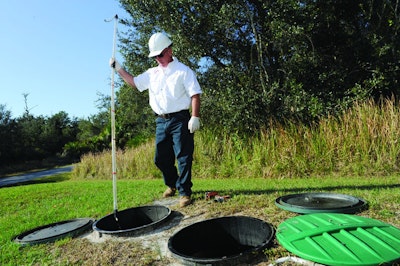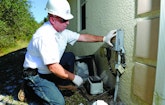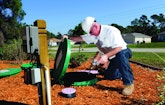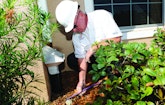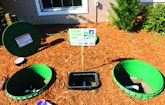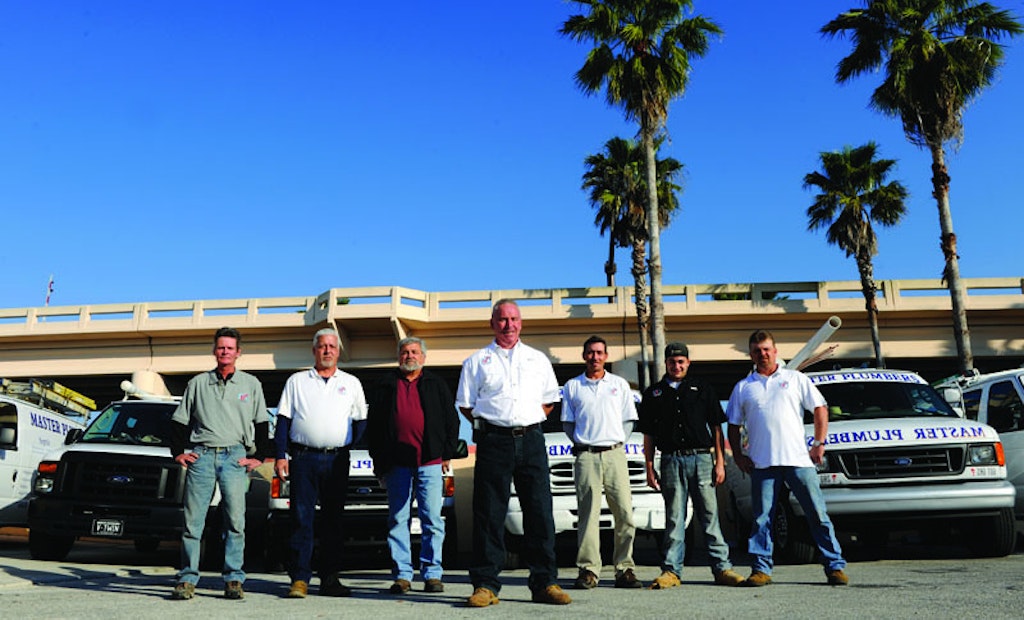
Interested in Systems/ATUs?
Get Systems/ATUs articles, news and videos right in your inbox! Sign up now.
Systems/ATUs + Get AlertsTough times require complex solutions. “Everybody was doing what was rational, and I didn’t see it working,” says Glenn Martin, owner of Master Plumbers and Septic in Bradenton, Fla. His solution was to do the opposite.
In 2009, 90 percent of Florida onsite companies were in some state of distress, but Martin opened his onsite, plumbing and gas business anyway. He began by purchasing 250 aerobic treatment unit maintenance contracts from another business.
The slow economy provided opportunities to buy quality equipment very inexpensively, for cash, from companies that had gone out of business. The strategy enabled Martin to add one used service van per year and hire another technician.
Instead of branching into pumping to complement onsite inspections and repairs, Martin added gas work: maintaining and repairing large boiler systems, and residential and commercial LP and natural gas products and systems. “Diversification is a survival tool, as it maintains revenue flow if one source goes soft or dries up,” he says.
Since he entered the onsite treatment industry at age 17 in 1980, Martin’s goal was to run his own company. “Master Plumbers and Septic has been in the black and growing since its first year,” he says. “I’m truly blessed to be living the American dream.”
Gaining experience
With his focus on the future, Martin went to night school for six years to earn his MBA degree from Richard Stockton College while working for Mr. John-Russell Reid portable restroom and septic service firm in Keasbey, N.J.
After graduating in 2003, Martin itched for bigger opportunities and found them as the Florida division manager for United Site Services, another portable restroom company. “They were on an acquisitions campaign, and I helped with due diligence and integration,” he says. “Each of the 17 acquired companies had something special that I hadn’t seen before, whether it was a truck design, marketing, or how they handled drivers. It taught me to look closely for details that would enhance the whole.”
Martin left United in 2005, one year before Florida’s economy began to decline. Subsequently, he looked for onsite companies for sale. After buying the ATU service contracts, he renamed his company Master Plumbers and Septic and began certifying to maintain ATUs from Norweco, Hoot Aerobic Systems, Acquired Wastewater Technologies, and Ecological Tanks. Instead of buying a new service van, he cleaned up and painted a used one, for which he paid $5,000 cash.
Martin also uses Tuf-Tite Inc.and Sim/Tech Filter lids and risers and Infiltrator Systems products for repairs and upgrades.
Martin also earned a master plumber’s license for a second revenue stream and went to work replacing complete water systems, detecting and repairing leaks, and inspecting piping and backflow preventers. Today, plumbing accounts for two-thirds of annual revenue. In four years, Martin grew gas work to 10 percent by installing new gas lines or repairing old ones, hooking up home appliances, and maintaining commercial boilers.
Whatever equipment he needed, Martin never bought on credit. “I can’t emphasize enough how important it is to pay as you go these days,” he says. “It keeps you focused on your receivables. I’ve seen too many people struggling because of too much equipment they couldn’t afford.”
Full steam ahead
Many homes in the ATU contract bundle were in foreclosure. “My goal was to provide wow-level service, enabling us to build relationships with Realtors, bankers, property managers and contractors preparing properties for sale,” says Martin. The company enjoys an 80 percent referral rate.
Onsite work includes septic system installation and maintenance, plumbing, well inspections, changing out pumps and control panels, and replacing or rebuilding air compressors for ATUs. Martin’s policy of documenting the work with photographs boosted referrals and helped grow the business rapidly.
“Many Florida homeowners are not year-round residents,” he says. “They’re from northern states or international. When we send electronic invoices or estimates for repair, they contain digital images of the problems. No matter who, every customer loves it because there is no confusion about what is going on.”
To gain entrance to homeowner associations and gated communities, Martin advertised in their newsletters. “That’s the only advertising I do,” he says. “My five technicians service subdivisions with up to 500 homes, and their visibility increases referrals as well.” The company services Manatee, Sarasota, Charlotte and Lee counties, and septic system work accounts for one-third of annual revenue.
With increased business comes a need for workers. Martin never hires anyone with a job in case his work slows – he doesn’t want to take someone away from a job and then have to let the person go. “The company is growing, but I’m nervous about the future,” he says. “In addition, unemployed people who have found jobs are energetic, anxious to learn, and so happy that they have better experiences with customers.”
While Martin occasionally hires inexperienced people – he finds training them easier than correcting bad habits – he never hires someone who doesn’t know how to email, text or send pictures, and who doesn’t have a computer and printer at home. “If our technicians encounter a problem on a job, they snap a picture and send it to someone, who calls and walks them through the solution,” he says.
Combining forces
Among Martin’s innovative measures was building a network of service providers. Business acquaintances often had excess, idle equipment and were afraid to expand. Martin needed a vacuum truck but didn’t want to buy one. He approached an associate with a vacuum truck and suggested opening an operations center, then splitting the rent and sharing equipment.
With the offer accepted, they found an office and double-bay deep-storage garage in an office park. “He pays rent one month; I pay it the next,” says Martin. “Lowering our individual rent by 50 percent enabled us to afford a larger office, and he handles my substantial pumping work.”
As the sharing idea prospered, they accepted friends into what Martin calls The Circle. Today, it comprises two septic tank pumping companies, four plumbers, one gas contractor and a garage mechanic. “Combining resources enables us to bid on large jobs, then subcontract the extra work to other members,” says Martin. “We never say no to customers. If the person receiving the call can’t handle the work or is unavailable, he refers the request to someone in The Circle.”
Last year, one of the septic service companies wanted to bid on rehabilitating a pump station, but the contractor lacked the necessary plumber’s license. He called Martin, who knew nothing about the work. “We learned together, completed the job, and satisfied the customer,” says Martin.
Before the mechanic joined the group, he had no work. Now he fixes members’ vehicles quickly and economically. Last winter, Martin added a 4,000-square-foot storage garage to accommodate more shared equipment. “New opportunities arrive all the time to different members,” he says. “As their trust in each other develops, they’re willing to take some risks. They’re also gaining confidence tackling projects they’ve never done before.”
Clearing the lines
Running the company from his home office (he uses the office at the operations center for meetings) left Martin struggling with how to keep regular customers from calling for septic and plumbing services generated by inspections. He wanted the phone free for new business. “I trained them to email the work orders,” Martin says. “Now I shoot back a message when we’ll be there, then forward the requests to drivers on their smartphones.”
Information on the company’s Web pages reduced feeler calls substantially. Martin meets with the webmaster monthly to add new information, change photos and keep the pages fresh. “We’re focusing now on adding more videos and tutorials for homeowners and nonresidential customers,” he says. “The most unorthodox thing I did was post testimonials from vendors and competitors. Those endorsements have clout.”
With the market for new installations nonexistent, suffocated by thousands of vacant properties or those in foreclosure, Martin continues to focus on inspections, repairs and maintenance. “I’ve had some success getting phone companies to assign numbers from out-of-business companies to me,” he says.
Martin would like to acquire another small company, enabling him to double revenue and run eight to 10 vans. “I’ve managed hundreds of people in large companies and would rather keep it simple,” he says. “I don’t want to be the biggest on the block, just the best.”
